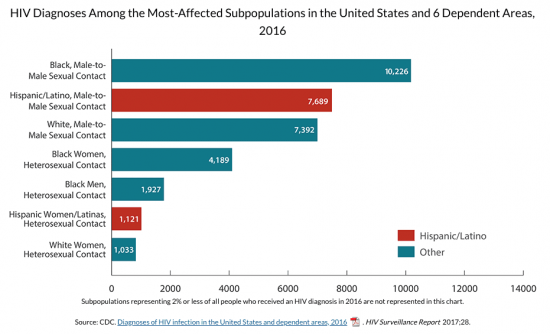 HIV remains a serious public health threat in the United States. While the United States had made progress in reducing the number of HIV infections, with prevention efforts leading to a nearly 20 percent decline in new HIV infections between 2005 and 2014, progress has been uneven, and the declines in new HIV infections have begun to stall in recent years. The number of new HIV infections began to level off in 2013. In 2013, there were an estimated 38,900 new HIV infections, and in 2016, there were an estimated 38,700 new HIV infections.
HIV remains a serious public health threat in the United States. While the United States had made progress in reducing the number of HIV infections, with prevention efforts leading to a nearly 20 percent decline in new HIV infections between 2005 and 2014, progress has been uneven, and the declines in new HIV infections have begun to stall in recent years. The number of new HIV infections began to level off in 2013. In 2013, there were an estimated 38,900 new HIV infections, and in 2016, there were an estimated 38,700 new HIV infections.
The populations with the greatest burden of new HIV infections are gay and bisexual men, especially Black and Latinx gay and bisexual men, and transgender people of color. From 2010 to 2016, new HIV infections remained stable at about 26,000 per year among gay in bisexual men, who account for approximately 70 percent of new infections. The national HIV surveillance system struggles with effectively monitoring transgender people, but data that does exist indicates that transgender women of color have the highest rates of HIV infection of any subpopulation in the United States.
Black and Latinx communities are also disproportionately impacted by HIV. Among gay and bisexual men, Black gay and bisexual men account for more new HIV infections than Latinx gay and bisexual men, who in turn account for more new HIV infections than white gay and bisexual men. Of particular concern is the fact that from 2010 to 2016 new HIV infections among Latinx gay and bisexual men increased 30 percent, even as new HIV infections remained stable among Black gay and bisexual and decreased among other groups. If this trend continues, 1 in 5 Latinx gay and bisexual men will be diagnosed with HIV during their lifetimes.
Latinx gay and bisexual men must be a priority population in efforts to reduce the size and scope of the HIV epidemic in the United States. Over the past year, the O’Neill Institute has focused on addressing the HIV needs of these men. In partnership with Bienester Human Services, we held a consultation meeting in Washington DC in March 2018 with a diversity of Latinx gay and bisexual men from across the country. Informed by the discussion at that consultation meeting, we wrote an issue brief that we will release later this month at the 2019 National HIV Prevention Conference in Atlanta. We also worked with a group of Latinx gay and bisexual to develop their own call to action, Addressing the HIV Crisis among Latinx Gay and Bisexual Men in the United States. The call to action was published in February 2019 after a second consultation meeting that the O’Neill Institute and Bienestar Human Services organized in December 2018 in Los Angeles.
In response to increases in HIV incidence and the structural barriers to service access among Latinx gay and bisexual men, the call to action calls on allies, policy makers, funders, and public health officials at the local, state and national levels to:
- Publicly denounce any anti-immigrant initiatives/laws. Develop action plans and implementation guidelines for ensuring unimpeded access to services for Latinx gay and bisexual men regardless of immigration status. This includes opposing changes to Public Charge rules.
- Include targets for Latinx gay and bisexual men and other men who have sex with men across ALL indicators in the National HIV/AIDS Strategy (NHAS) update, in close consultation with community leaders.
- Prioritize the HIV prevention and treatment needs of Latinx gay and bisexual men in the End the Epidemic Initiative, especially in focus jurisdictions experiencing increases in new HIV infections.
- Direct increases in domestic HIV funding to Latinx gay and bisexual men’s programs and organizations that provide comprehensive, community-led prevention programs that include PrEP and PEP.
- Increase funding for the Ryan White HIV/AIDS Program and support Medicaid and Marketplace reforms that advance universal health coverage and reject health care reforms that result in increased uninsured rates and reduced access to medically necessary prevention, care and treatment services.
- Create guidelines for state and local health department’s HIV planning bodies that address recruitment, engagement, retention, and leadership development practices that are culturally/linguistically competent to ensure the full participation of Latinx gay and bisexual men.
- Fund comprehensive (one-stop-shop) stigma-free, culturally/linguistically competent, evidence-informed and rights-based programs that include HIV/STI testing, prevention, care, and treatment, mental health, substance use, legal and other support services.
- Meaningfully support the leadership pipeline by funding training and learning exchanges, creating safe professional development spaces, and creating leadership positions and other jobs for young Latinx gay and bisexual men in the HIV sector.
While the call to action is focused on HIV prevention among Latinx gay and bisexual men, it includes a solidarity statement with Latinx transgender women and men, demanding a comprehensive response to heal Latinx communities. Continued work is needed to enhance the response to HIV in Latinx communities. To learn more about the call to action or sign on to it, click here. The time to act is now.



